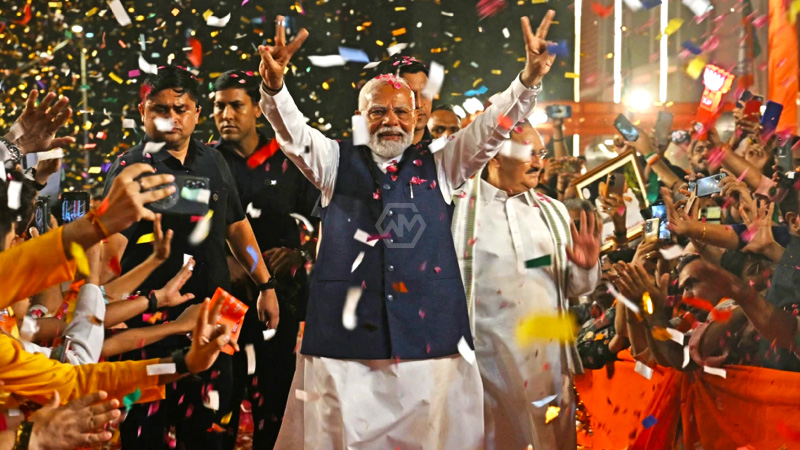- Modi declares victory despite reduced seat count
- Coalition partners crucial as BJP fails to secure majority alone
- Opposition gains reflect voter concerns on economy and polarization
Despite Prime Minister Modi’s declaration of victory in India‘s general election, the reduced seat count for his party signals a shift in the country’s political dynamics.
The opposition’s unexpected gains, particularly in key states like Uttar Pradesh and West Bengal, highlight growing concerns among voters regarding economic performance and political polarization.
Navigating India’s political waters: Modi’s Coalition Conundrum
Prime Minister Narendra Modi declared victory in India’s general election, yet his party, the Bharatiya Janata Party (BJP), fell short of a majority, winning only 240 seats. This marks a significant decline from the 303 seats secured in the 2019 election, necessitating reliance on coalition partners for the first time since 2014.
The opposition made significant inroads, with the Congress party improving its tally to 99 seats and regional parties like the Samajwadi Party and All India Trinamool Congress gaining substantial ground. These results reflect a pushback against Modi’s economic policies and polarizing political style.
Modi’s coalition partners, including the Telugu Desam Party and Janata Dal (United), now hold critical leverage in the National Democratic Alliance. Their support is essential for Modi to secure a stable majority and move forward with his legislative agenda.
Voter concerns over economic issues, particularly job creation, played a significant role in this election. The results indicate that while Modi remains a popular figure, Indian voters are signaling the need for a shift in focus towards economic development and inclusive governance.
The election results highlight the changing landscape of Indian politics, where Modi’s leadership remains influential but increasingly reliant on coalition dynamics. Addressing economic challenges and fostering inclusive governance will be essential for maintaining stability and meeting the evolving expectations of Indian voters.
“Indian voters can’t be taken for granted,” stated the Times of India, reflecting the electorate’s demand for job creation and economic progress in response to the mixed results of Modi’s BJP in the recent election.



